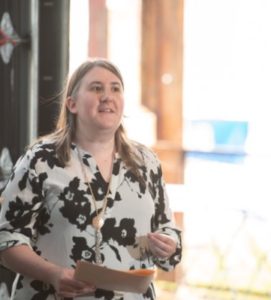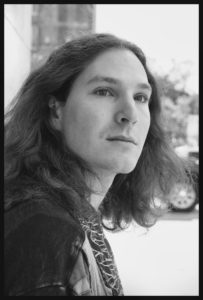11 May Studying the Stars in our Universe of New Plays

Studying the Stars in our Universe of New Plays
by Heather Helinsky, Playwrights Foundation Literary Manager
2021 Applicant Demographics Report prepared by Kieran Beccia, Associate Literary Manager
Playwrights Foundation strives to put the writer at the center of the dramatic universe. But the path writers make each season—applying for an opportunity in the fall and then receiving a notification letter in the spring—is far from a perfect circle. In all honesty, I don’t know what shape playwrights themselves would describe for the process of sending their play out into the universe, because many would agree that they don’t feel at all centered in this kind of festival selection process. I imagine to many writers it feels like a black hole where their work gets spaghettified.
Yet, as a dramaturg, this is my ultimate goal: to find a way to center our playwrights. Playwrights are our sun, the center around which we revolve, because their powerful words are a revolution for our times. Yet, to all appearances in a national festival where we can only support five out of 755 playwrights at the Bay Area Playwrights Festival, it seems more like a moonshot.
As I wrote last season in my article “The Challenge of Cultivating a Garden of New Plays”, our Literary staff was then a team that was new to this 44-year old organization. Our first step in taking care of the playwrights was to make sure our National Committee readers were as diverse as the writers who applied. We also worked to make sure we had theatre professionals who were experts in different styles and genres, so that we were able to welcome formal experimentation in what a new play should look like.
After persevering through our first season as a new literary team, we realized there were many other aspects of the process we wanted to change. Utilizing feedback we received from the playwrights in the wider community, we met with the Dramatists Guild to consult their insights into Best Practices for Contests and Festivals.
As an organization, we are committed to creating a more equitable and inclusive process. Some of the recommendations and staff reflections will be immediately visible and implemented, while others are still shaking up our internal process in ways we hope the wider community of playwrights will see over several seasons. This helped us examine our values as an organization, and reaffirmed our commitment to uplifting under-represented and historically marginalized voices. We communicate this on our website application page that special attention in our reading process is given to writers who are Bay Area based, emerging writers of any age, differently-abled writers, BIPOC writers and/or other historically marginalized writers.
One of the more visible ways was our decision to lower barriers to entry through offering a sliding scale fee in addition to fee waivers for those in financial need instead of our prior $20 flat rate.
Another way of centering our playwrights and supporting our value of uplifting under-represented voices is using the demographic information writers give us on their application to better our process. This data allows us to look at trends in our applicant pool and plan our future outreach efforts according to who we see either represented or not.
Demographics help us understand the wider community of playwrights and challenge our own biases. Knowing who applies to BAPF also provides some challenges for us internally that re-open discussions of how we can better select plays in the future. We can interrogate the demographics over the course of several seasons and investigate why certain groups struggle to gain footing throughout the process, which may lead to more innovative thinking.

Kieran Beccia (they/them)
We decided to consider the season 2019-2020 as our “baseline year,” where the new leadership and Literary team started in October ’19. You can find a report of our demographics data here, compiled by Associate Literary Manager, Kieran Beccia. We realized rather quickly by studying the total community of playwrights who apply that Playwrights Foundation has to do some self-reflection and consider what groups and identities consistently have a tough time succeeding in a process like this, starting at the first step with the application itself.
We will undoubtedly have to commit more time and energy to thinking through what it is about the nature of the current festival structure that advantages some communities over others. For example at BAPF, we have a strong commitment to local writers. However, with the pandemic, we noticed an influx of national writers who did not apply in the past years, perhaps because other new play festivals were not running this season, so in the Semi-Finalists and Finalists rounds, there will be a noticeable difference to increase the representation of local Bay Area playwrights. In addition, our process attempts to increase equity in the applicant pool in each round. Playwrights of color, for example, represented approximately 30% of the initial applicant pool in both 2020 and 2021, however, they represented slightly more than 50% of the Finalists in both years.
When choosing plays through a more playwright-centered process, it’s even more important to consider whose voices are represented on the reader committees, we welcomed more playwrights to the National Committee by inviting writers who were taking the year off from applying. Last season 33% of our National Committee was made up of playwrights, this season, we increased the group to 47%.
Through this change, we found more ways for playwrights to engage with us and be an important part of the conversation of what work gets supported this season. We also want those writers who read for us to be better set up for success when they’re ready to apply again. Our ultimate goal is to have over 50% playwright representation in our reader community each year. A benefit for playwrights who serve is that they get to know our organization’s values. Playwright Stephanie A. Walker, who was a Finalist in last year’s season, decided to become a National Committee reader instead of an applicant, and shared with us: “I’m so encouraged by how lovely you treat the playwrights that apply for BAPF.”
We also re-envisioned the process by promoting more opportunities for community collaboration. Traditionally in the process of a large contest or festival, after a writer applies, plays are then distributed to individual readers on a national committee. They’re then given some sort of scoring system and rubric that describes the festival’s standards for what makes a good play. The reader is then responsible for finding time for analysis and returning a written report to the Literary office. It’s straightforward, but the burden does fall on the individual reader to indicate their personal tastes and how much time they have to read.
We moved towards a more community-centered approach by connecting readers through a large Slack platform, hosting Zoom events for readers twice a month, and building a statement of our readers’ collective values that build on the expressed organizational values. These discussions gave us more opportunities for the readers to discuss the plays on a deeper level and give space to discuss what challenges they were experiencing when encountering a play that was taking some storytelling risks and experiments with form.
The readers were quick to note the difference in our process and how it influenced their experience centering playwrights. “I’ve been a script reader for a decade with many different companies, including BAPF, and this year was a breath of fresh air.” says Fiona Kyle, a NYC-based dramaturg who participated this season. “The Literary team was open about sharing their goals for the festival and challenges they were facing, and that made me feel much more invested in the process.” Another reader, LA-based playwright Amanda Andrei, who was a reader for the first time this season explained: “I also felt like the team took into account matching plays with readers — I wasn’t just tossed a random play, we were asked about in which subjects we had expertise, what communities we belonged to, etc., so right off the bat, plays could be read by folks who had matching context and background knowledge given the subject matter of the work.”
A community-centered approach to new play development is by its nature more democratized—even when evaluating a high volume of new plays in a short period of four months. This community helps us all have a deeper understanding of each and every play, instead of all the readers working on their own lonely planet.
After such a large group of national theatre artists read and evaluated every play twice, the Literary team considered all the recommendations and moved 130 plays forward to the Semi-Finalist round. We invited twenty Bay Area artists to join our Literary Council who help advocate for plays to move forward to Finalists and Festival plays. This incredibly dedicated group reads an average of thirty-three plays in the span of two months.
Once again, we went through a process where together, the group built their own community values through which to analyze the plays under consideration. Out of our dedication to reading plays in consideration fully, all Semi-Finalist plays received a minimum of three reads (sometimes more with staff reading along). Then, all Finalist plays were read at least ten times by Literary Council members and staff. For writers who hope to get more eyes from professional theatre-makers on their play, we aim to do this for all our Semi-Finalists and Finalists with the amount of reads we require before making our decisions on what moves forward.
It is also during the Literary Council’s evaluation stage where all our readers are making assessments based on the writer’s stated development goals. Development goals are helpful in assuring that a playwright who sends us a first draft may have the same chance as a writer who sends us a play further along, as we are aware that playwrights have their own metrics and comfort levels for when they’re interested in sharing their new play. Without assessing Development goals, it would be easy for a play that looks like the most well crafted to be deemed “the best”, but an important check in our system is to evaluate where a writer is in their process and make sure whatever draft the writer is on, it can succeed to the next round.
We are always aiming for best practices in the process, while at the same time learning about what changes we need to make for next year. New for this year, we increased payment for our Lit Council to reflect the amount of work each reader puts in by a pay-per-play model instead of a volunteer stipend. We also added an additional meeting in April for the Literary Council to participate in staff conversation as we discussed the top fifteen plays, leading to more perspectives and voices involved in our final decisions in a more transparent way.
In the end of a season-long process like this one, there’s an abundance of excellent and difficult choices. Now that our season has been chosen, the Literary team continues to review, process, and reflect on what we learned from our wider reading this season and implement further changes in the future. We will continue to consult with the Dramatists Guild and our community of readers and playwrights to discuss better practices that can deepen our process, as well as offer more opportunities for writers to engage with Playwrights Foundation throughout their entire journey.
The plays which are being written right now will be the words we hear when we eventually re-open our theatres. Reading each play is like star-gazing; imagining what we hope the future of American theatre will be through the huge celestial bodies that have traveled light-years to shine through to Earth’s night sky. While I can’t predict the future, what I can say with certainty: we’ve read our applications this year with great care, humility, and optimism, and are steadfast in our hopes to be intentional about the new voices that we can rocket forward to national attention.
Heather Helinsky, Literary Manager (she/her) is a Philadelphia-based dramaturg that playwrights have recognized as “especially adept at freeing energies in unexpected ways. She encourages discovery.” Nationally, her dramaturgical work has been seen at the Accessible Theatre, American Repertory Theatre, the Apothetae, Arizona Repertory Theatre, Arkansas New Plays Festival, Athena Project Festival, Best Medicine Rep, Borderlands Theatre Company, City Theatre, Colorado New Play Summit, Denver Center, Great Plains Theatre Conference, James Madison University, The Kennedy Center, The Lark, Lee University, Moscow Art Theatre’s American Studio, Omaha Community Playhouse, Pennsylvania Shakespeare Festival, Philadelphia Theatre Company, Phoenix Theatre, Pittsburgh Irish and Classical Theatre, Pittsburgh Public Theatre, Plan-B Theatre, Plays and Players of Philadelphia, PlayPenn, Salt Lake Acting Company, Telluride Playwrights Festival, Unexpected Stage, Woolly Mammoth, Venus Theatre, and the 6NewPlays collective in San Francisco. For two seasons, she served as a Barrymore Judge for Theatre Philadelphia, which adjudicates 60-100 productions in the Philadelphia region and is currently a board member for LMDA as VP of Freelance. She’s read and evaluated scripts for The O’Neill, PlayPenn, Great Plains Theatre Conference, Jewish Plays Project, Seven Devils and Sundance Theatre Lab. She has been the Literary Manager of the Pittsburgh Public and PICT Classic Theatre. For the Kennedy Center, Heather mentors student dramaturgs, regionally and nationally, since 2012, and reads for the David Mark Cohen & Steinberg award. Other Kennedy Center projects include the Undergraduate Playwrights Workshop, the VSA Discovery Series, the Page-to-Stage Festival, and two seasons of the MFA Playwrights Workshop for NNPN. She was a Visiting Professor of Dramaturgy at Carnegie Mellon (’12-’13), University of Arizona (’07-08), Lesley University (’15-’16) and Brooklyn College (’15) and taught a workshop in Spring ’19 to the Yale School of Drama 1st & 2nd year dramaturgs. She holds an MFA in Dramaturgy from the ART/Moscow Art Theatre Institute for Advanced Theatre Training at Harvard ’07, where she studied with Playwrights Foundation founder Robert Woodruff. www.helinskydramaturgy.com
Kieran Beccia, Literary Associate and Rough Readings Associate Producer (they/them) is a Bay Area director, producer, and actor focused on devised and ensemble performance, development of new work, and subversion of classics. Recent favorite directing credits include Sarafael (The Forum/Ubuntu Theater Project), Where the Boys Are (FaultLine Theater), Legal Tender Loving Care (Dragon Theater/Fuse Theater), Hidden: A Gender (Variance Festival) Pains of Youth (independently produced) and The Tempest (Barnstorm). They have assistant-directed around the Bay Area, including TheatreWorks Silicon Valley, Magic Theatre, and Shakespeare Santa Cruz and sat on the literary council for the Bay Area Playwrights Festival. They are a TITAN Award recipient, a two-time CA$H Grant recipient, a company member at the Ubuntu Theater Project, a former artistic director of the U.C. Santa Cruz poor theatre performance lab, Barnstorm, and a founding member of The Forum.



No Comments